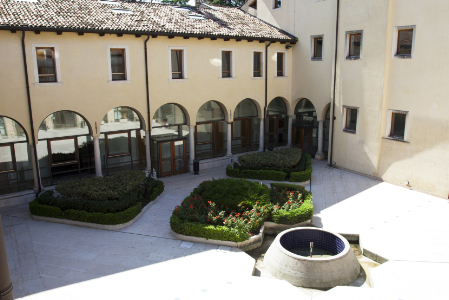Learning outcomes
The course analyses a specific sector of the Criminal Law regarding business and economics, which is of increasing relevance in the modern social and individual life. Its aim is to give students a specific knowledge of some fields of the criminal responsibility related to economic activity. At the same time it gives them the juridical and cultural instruments necessary to understand its constant evolution and its frequent modifications. These changes depend from one side on the ever-changing aspects of the economic and job system and for the other side on the criminal policy orientations during the historic development of the penal legislation.
As result of the course the students should be able to set correctly the different sectors of the Economic and business Criminal Law, with specific reference to the constitutional principles and European sources, to refer the regulation of corporate liability to their of the physical persons for the offences committed in economic activities, recognizing their constitutive elements and circumstances, the related criteria for the attribution of the penal responsibility, the legal protected interests, the eventual concurrence of more offences, to solve case in the mentioned sectors.
The course is divided in 2 module each of 18 hours (3 CFU).
A) in the first one, after a
a) general introduction regarding the systematic of the different topics and sources, the protected legal interests in the related sectors, and the basic principles of the individual liability and the corporate liability (legislative decree 231/2001),
the course will focus
b) on the crimes “against the public economy”, provided by the Title VIII of the Italian Penal Code, with special regard to:
i. crimes against the “national economy”;
ii. crimes concerning some forms of illegal strike and lockout
The main scope of this part is to show the progressive and not completely realized adaptation of the Economic Criminal Law to the economic and constitutional system, focusing in particular on the Constitutional Court decisions and the legislative modifications. Then the course will focus on more relevant offences such
iii. trade crimes and offences against the market competition
iv. penal protection of the rights of consumers
v. the fight against counterfeiting and imitation
B) The second module will focus on the complementary penal legislation (outside the criminal code) and in particular on the following crimes:
a) corporate crimes, modified by the legislative decree 61/2002. Special attention will be paid to the modifications adopted in 2005 and in 2015 (with the Law n. 69/2015), which has reformed the false corporate communications. The focus will be to show the different protection perspective and the problems of compatibility with the European Law.
b) crimes included in the legislative decree 58/1998 which concern the financial brokering, with special regard to the crimes of market manipulation, market abuse and insider trading, modified in line with the European legislation concerning the market abuse (Directive UE 57/2014) and with the ECHR decisions (leading case Grande Stevens).
c) bankruptcy fraud and insolvency crimes provided by the insolvency law (r. decree 267/1942) and the following most recent legislative reforms.
d) offences concerning the protection of the security and the safety of the workers in the working places, firstly modified by the legislative decree 626/1994 and then by the legislative decree 81/2008, in order to implement the European legislation. This part will be focused on showing the tendency to adopt preventive measures and sharing the framework of the criminal liability related to the risk management and the corporate organization, between individual persons and the corporation (in conformity with the legislative decree 231/2001). Special attention will be paid to the case law concerning the offences against the life and the individual and public safety.
Teaching methods
Teaching methods are different with regard to students who will attend the course, taking in account the repeated legislative interventions and different interpretation in case law, also at supra-national level. For students who will attend the course the methods will consist in frontal lectures about the basis and fundamental categories of the concerned matters of Criminal Law and specific issue, supported through slides, which are at disposal for the students through on line e-learning together with specific contributions and articles or recent judgments.
Also workshops with regard on the recent reform and/or important and different interpretation in case law could be organized with restricted number of interested students.
During the academic year students may contact professors and use their students timetable (date of receipt). See the website of the Department of Law.
With regards to students who will not attend the course, the methods consist in the support of professors for an up to date study, available also through online information. After online registrations students may access to e-learning materials and slides.
Recommended books
The regular consultation of the sources is warmly recommended: a recent edition of Criminal Code which should include in the Annex also the legislative Decree 231/2001 and their new reforms; and the mentioned complementary legislation (arts. 2612 ff. civil code; legislative decree 58/1998; r. decree 267/1942; legislative decree 81/2008, and their new reforms).
For the 2 Parts of the course are to study the corresponding following texts:
1. *FIANDACA G., MUSCO E., Diritto penale. Parte speciale. Vol. I, 5^ ed., Zanichelli, Bologna, 2012, only the Chapter 8: Delitti contro l’economia pubblica, l’industria e il commercio.
2. MAZZACUVA N., AMATI E., Diritto penale dell’economia. Problemi e casi, 3^ ed., Cedam, Padova, 2016.
The exam consists in an oral interview of the student by the professors and their collaborators which regards the following aspects:
• Level and depth of knowledge and understanding
• Language properties
• Ability to connect systematically the understanding
• Analytical and arguing ability also in solving cases
Evaluation runs on a scale from 0 to 30/30, the candidate who demonstrates an excellent preparation and exposition ability could achieve the recognition of the laude. Successful completion of the examination starts from 18/30.







